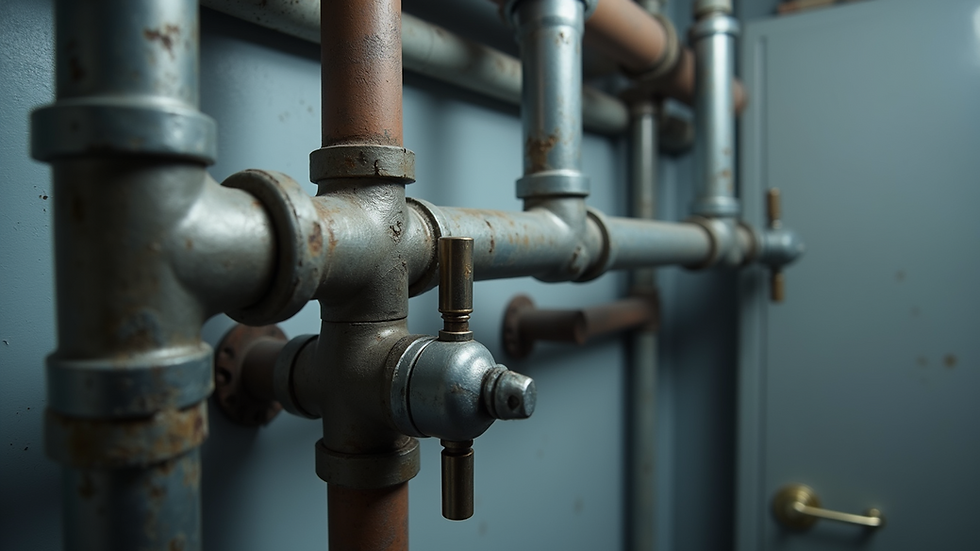What to Know Before Installing Gas Lines in Your Home
- joshfisher8
- Oct 28, 2025
- 3 min read
Installing gas lines in your home is a significant project that requires careful planning and attention to detail. Whether you are upgrading your heating system, adding a gas stove, or installing a new water heater, understanding the essentials of gas line installation is crucial for safety and efficiency. This guide will walk you through the key points you need to consider before starting the process.
Understanding the Basics of Gas Lines
Gas lines are pipes that deliver natural gas or propane from the main supply to your appliances. These lines must be installed correctly to prevent leaks, ensure proper gas flow, and comply with local building codes. Gas lines are typically made from materials such as steel, copper, or flexible CSST (corrugated stainless steel tubing).
Key considerations include:
Material choice: Different materials have different durability and installation requirements.
Pipe sizing: Proper pipe diameter is essential to maintain adequate gas pressure.
Routing: Gas lines should be routed away from electrical wiring and sources of heat.
Ventilation: Proper ventilation is necessary to avoid gas buildup in case of leaks.
Before starting any work, it’s important to check with your local utility company and building department to understand the regulations and permits required.

What You Should Know About Gas Line Installation
Gas line installation is not a simple DIY task. It involves working with flammable gas, which can be dangerous if handled improperly. Hiring a licensed professional ensures that the installation meets safety standards and local codes.
Here are some important points to keep in mind:
Permits and inspections: Most areas require permits for gas line work. Inspections ensure the installation is safe and compliant.
Leak testing: After installation, the system must be tested for leaks using specialized equipment.
Appliance compatibility: Ensure your appliances are compatible with the type of gas supplied.
Emergency shutoff valves: These should be installed for quick gas shutoff in case of emergencies.
Cost factors: Installation costs vary depending on the length of the line, materials used, and labor.
For a safe and reliable setup, consider professional gas line installation.

Can I Install a Gas Line Myself?
Many homeowners wonder if they can install gas lines themselves to save money. While it might seem straightforward, gas line installation requires specialized knowledge and tools. Here are some reasons why DIY installation is not recommended:
Safety risks: Improper installation can lead to gas leaks, fires, or explosions.
Code compliance: Licensed professionals are familiar with local codes and regulations.
Insurance issues: DIY work may void your home insurance policy if something goes wrong.
Testing and certification: Professionals have the equipment to test for leaks and certify the system.
If you are experienced in plumbing and gas systems, you might handle minor repairs or appliance connections. However, for new installations or major modifications, hiring a licensed plumber is the safest choice.

Safety Tips for Gas Line Installation
Safety should be your top priority when dealing with gas lines. Here are some practical tips to keep in mind:
Turn off the gas supply before starting any work.
Use approved materials and fittings designed for gas use.
Avoid open flames or sparks near the work area.
Ventilate the area well to prevent gas buildup.
Use a gas detector to monitor for leaks during and after installation.
Follow manufacturer instructions for all appliances and components.
Schedule professional inspections after installation.
By following these guidelines, you can minimize risks and ensure a safe environment for your household.
Maintaining Your Gas Lines for Long-Term Safety
Once your gas lines are installed, regular maintenance is essential to keep them in good condition. Here are some maintenance tips:
Inspect lines annually for signs of corrosion, damage, or leaks.
Listen for hissing sounds or smell for gas odors regularly.
Keep the area around gas lines clear of debris and flammable materials.
Schedule professional inspections every few years.
Replace old or damaged pipes promptly to prevent leaks.
Proper maintenance not only extends the life of your gas system but also protects your home and family from potential hazards.

Preparing for Your Gas Line Installation Project
Before you begin your gas line installation project, take these preparatory steps:
Plan the layout: Decide where the gas lines will run and which appliances will be connected.
Obtain necessary permits: Contact your local building department to secure permits.
Hire a licensed professional: Choose a reputable plumber or gas technician.
Schedule inspections: Arrange for inspections during and after installation.
Inform your utility company: Notify them of your project to coordinate gas supply.
Being well-prepared helps the installation process go smoothly and reduces the risk of delays or complications.
By understanding these essential aspects of gas line installation, you can make informed decisions and ensure your home’s gas system is safe, efficient, and compliant with regulations. Whether you are upgrading existing lines or installing new ones, professional guidance and careful planning are key to a successful project.




Comments